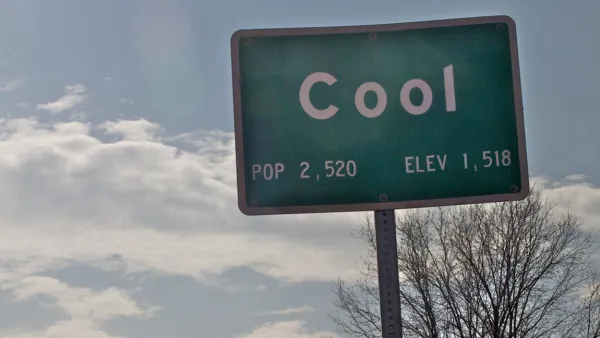Big Oil may have defeated Gov. Jerry Brown's oil reduction goal in the legislature this month, but there are other avenues for the green governor to pursue his climate change agenda. The Low Carbon Fuel Standard was renewed by CARB on Sept. 25.
Judging by Gov. Jerry Brown's reaction to the major weakening of what many thought to be the most important environmental bill this legislative season, an observer would be forgiven for not realizing the significance of the loss of what would have been a landmark commitment to reducing oil consumption in the nation's third largest oil-producing state earlier this month.
“We don’t have a declaration in statute, but we have absolutely the same authority,” Brown said. “We’re going forward. The only thing different is my zeal has been intensified to a maximum degree.”
Gov. Brown has made fighting climate change a hallmark of his two-term administration. Having stated in his inaugural address in January that he would pursue a 50 percent reduction in oil consumption in 15 years, he will now take that goal to the state Air Resources Board (CARB), where he need not worry about Republicans and so-called "moderate Democrats" who were influenced by the successful campaign waged by the Western States Petroleum (WSPA) to defeat the oil reduction mandate.
"Michael Shires, an associate professor of public policy at Pepperdine University, said that Mr. Brown lost in the Legislature on the 50 percent reduction because the oil industry was able to make the case to many regular Californians — including many Democrats — that the change would be too costly to consumers," writes Ian Lovett for The New York Times.
"Brown is now relying on existing law and his own administrative authority," writes David Siders in a "Capitol Alert" for the The Sacramento Bee.
“They are going to try to do as much as they can on the executive side,” said Rob Lapsley, president of the California Business Roundtable. “So we expect a full-court press ... to move these policies forward.”
Brown will pursue his oil reduction goal in the Low Carbon Fuel Standard, a CARB program and "a central part of California’s greenhouse gas reduction program," writes Siders. "It requires producers of gasoline and other transportation fuels to reduce the carbon intensity of their products by at least 10 percent by 2020, with a shifting focus to cleaner fuels."
smaller than the governor had wanted."
“This policy is at the very heart of that goal of a 50 percent reduction — even just doing what we’re doing now will get us pretty close,” said Daniel Sperling, a member of the California Air Resources Board.
Furthermore, Sperling claimed that the low carbon fuel standard "is the best model in the world right now for how to reduce the carbon intensity of our fuels. It’s a model that I think we’re going to see more and more other places imitate," he said.
To date, the only other state to have such a program is Oregon, though it came close to being terminated in exchange for an increase in the gas tax, which didn't happen. Opponents claimed that the program would cause a larger increase in gas prices than the four cent increase in the gas tax.
Lovett writes that the renewal of the California program will affect gas prices: "The state’s own projections estimate that fuel costs could rise 13 cents per gallon by 2020 as a result of the low-carbon standard."
Using low carbon fuels to replace gasoline and diesel fuel is at the heart of the program, but WSPA charged that "there are still not enough low-carbon biofuels available in sufficient quantities to allow refiners to comply with the regulations."
And there are risks to cost increases, reminds Professor Shires. "[I]f prices go up too far — or officials are seen as overreaching — voters may be willing to use a ballot initiative to reign in the Air Resources Board’s power, Mr. Shires said," writes Lovett.
FULL STORY: Following petroleum defeat, Jerry Brown’s air board flexes muscle on climate

Analysis: Cybertruck Fatality Rate Far Exceeds That of Ford Pinto
The Tesla Cybertruck was recalled seven times last year.

National Parks Layoffs Will Cause Communities to Lose Billions
Thousands of essential park workers were laid off this week, just before the busy spring break season.

Retro-silient?: America’s First “Eco-burb,” The Woodlands Turns 50
A master-planned community north of Houston offers lessons on green infrastructure and resilient design, but falls short of its founder’s lofty affordability and walkability goals.

Test News Post 1
This is a summary

Analysis: Cybertruck Fatality Rate Far Exceeds That of Ford Pinto
The Tesla Cybertruck was recalled seven times last year.

Test News Headline 46
Test for the image on the front page.
Urban Design for Planners 1: Software Tools
This six-course series explores essential urban design concepts using open source software and equips planners with the tools they need to participate fully in the urban design process.
Planning for Universal Design
Learn the tools for implementing Universal Design in planning regulations.
EMC Planning Group, Inc.
Planetizen
Planetizen
Mpact (formerly Rail~Volution)
Great Falls Development Authority, Inc.
HUDs Office of Policy Development and Research
NYU Wagner Graduate School of Public Service



























